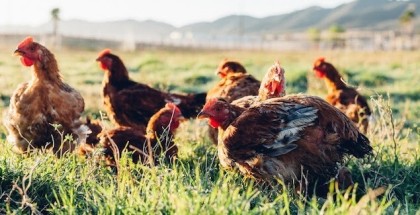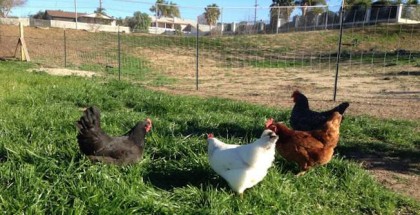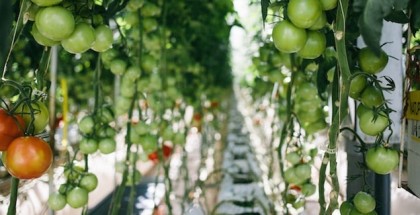Posts By AJ Hughes
Amidst Changing Economic and Growing Climate Temecula’s Crows Pass Farm Adapts to Survive
April 13, 2016 | AJ Hughes
David and Tina Barnes are co-founders of Crows Pass Farm in Temecula. (photo courtesy Tina Barnes/Crows Pass Farm)
The ability to adapt is a necessary skill for survival in many arenas, especially in farming. David and Tina Barnes of Crows Pass Farm in Temecula, California know this truth from their own experience.
The farm was founded by the Barneses in 1991 and until recently produced a wide variety of crops including lemons, tangerines, oranges, strawberries, spinach and more.
To insure the economic sustainability of their farm, the Barneses initially employed a direct-to-restaurant business model and as recently as 2010, this approach led to success. At that time they were selling food directly to 45 eateries and business was booming.
Citing drought conditions, economic downturns, changing market conditions, an upcoming state minimum wage increase to $15 per hour, and the need to compete against produce growers who sell at a cheaper price, the Barneses made the decision to retrench and change the farm’s business model. Read More
Pasture-raised Livestock Operation in Murrieta, CA Finds Success by Getting People to the Farm
April 12, 2016 | AJ Hughes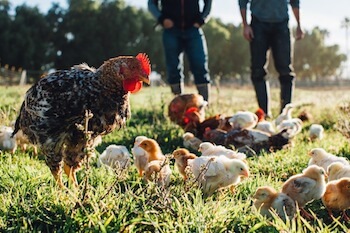
Murrieta, CA-based Primal Pastures is a family farm that sells pasture raised chicken, pork, lamb, beef, honey, and wild seafood. (Photo Credit: Kathi Bahr)
“We’re trying to take farming practices back 100 years, but put the business model 10 years ahead,” says farmer Paul Greive of Murrieta, CA-based Primal Pastures.
Greive and three of his in-laws founded Primal Pastures in 2012, starting with pastured free-range chickens. The small family farm has since expanded its offering and, in addition to poultry, now sells pasture raised pork, lamb, beef, honey, and wild seafood to its customers.
Primal Pastures is not an organic farm, but Greive takes pride in the fact that he and his fellow farmers employ regenerative and environmentally responsible farming practices that “go beyond sustainability.” Read More
‘Beyond Organic’ Farm Emerges in Riverside’s Glen Valley to Seize Upon Local Food Opportunity
April 8, 2016 | AJ Hughes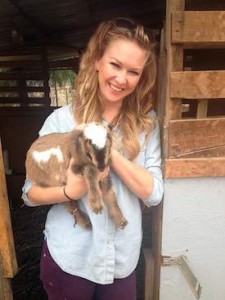
Kayla Causey is operator and owner of Sunny Cabana Farms in Riverside, CA where she raises goats and chickens. (photo courtesy Kayla Causey/Sunny Cabana Farms)
The story of Sunny Cabana Farms began when Cal State Fullerton lecturer Kayla Causey and her husband decided that they wanted more elbow room than their Orange County suburb could provide. So, in 2014 they moved to Riverside’s spacious Glen Valley area and began to lay the groundwork for a farm that would provide locally produced food and value added products to area residents.
Five chickens who already lived on the two-acre plot gave Causey a head start. Since then, Causey’s added dairy goats and Kunekune pigs (a heritage breed) as well as more chickens. An onsite orchard produces oranges, lemons, pomegranates, pears, grapefruit and apricots. Currently Causey milks seven dairy goats, which provide milk and kefir for her family. From the goat milk she also makes cheese and a variety of soaps and lotions.
Sunny Cabana Farms sells several of these items, but since it’s not a licensed grade A dairy, its milk and cheeses can’t legally be sold for human consumption. Read More
Urban Farmer AG Kawamura Sees Local Food Marketplace and New Technology as Keys to Future of Agriculture
April 4, 2016 | AJ Hughes
A.G. Kawamura of Orange County Produce is the former Secretary of the California Department of Food and Agriculture. (photo courtesy A.G. Kawamura/OC Produce)
Urban farmer A.G. Kawamura is doing his part to preserve and foster the agricultural heritage in Irvine, California, a city of more than 250,000 in the heart of heavily-populated Orange County, just south of Los Angeles.
Kawamura, the former secretary of the California Department of Food and Agriculture, is in charge of field production at family-owned Orange County Produce. His grandparents immigrated to California from Japan in the early 1900s and began farming. Then, in 1958, his father moved the operation, then known as Western Marketing Company, to Orange County. In 1994, the family changed the company’s name to Orange County Produce because of their belief that Orange County still wants to participate in its agriculture heritage.
Because of its strategic location in Southern California, Kawamura believes Orange County Produce can make an impact throughout the region.
Value-Added Products from Citrus Jam to Goat Milk Soap Fuel Local Food Movement in Riverside
March 22, 2016 | AJ Hughes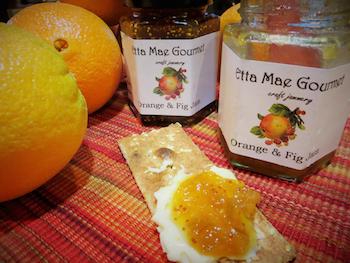
Orange & fig jam is one of many flavors offered by Riversidebased Etta Mae Gourmet. (photo courtesy Laura GoalenAnderson/Etta Mae Gourmet)
For centuries, artisans have added value to agricultural produce. Today, soap made from locally sourced goat milk and jam made with citrus sourced from local groves are among numerous value-added items available in Riverside, California.
Laura Goalen-Anderson of Etta Mae Gourmet and Janice Lake of Goat Rodeo Soap took different routes toward becoming value-added entrepreneurs, and both are passionate about providing quality products that include ingredients grown and raised locally.
Goalen-Anderson has always liked to cook, and making jams is one of her main culinary interests. In 2013, the Riverside Food Co-op approached her to see if it could offer her jams to its members. She was delighted to be included, and her local “craft jammery” in downtown Riverside was born. She named the business after her grandmother, Etta Mae, who each year made strawberry jam and orange marmalade. Read More
In Face of Citrus Greening Disease and Unsustainable Prices, Can Riverside’s Citrus Industry Endure?
March 21, 2016 | AJ Hughes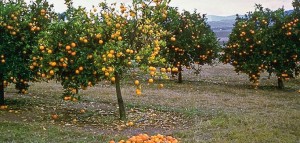 “Riverside oranges are a beautiful commodity, and have the best taste ever,” says Riverside farmer Brian Griffith. But in the face of citrus greening disease and unsustainable prices, can the citrus industry in Riverside, California endure?
“Riverside oranges are a beautiful commodity, and have the best taste ever,” says Riverside farmer Brian Griffith. But in the face of citrus greening disease and unsustainable prices, can the citrus industry in Riverside, California endure?
To get an answer to this question, we spoke with an entomologist and two orange growers. The entomologist is confident that Riverside citrus will survive citrus greening disease (otherwise known as HLB), and both growers are moving forward with realism tinged optimism. At the moment, though, there are no easy answers—only complex ones.
Insect Helped Expose Existing Problems
The Asian citrus psyllid, a sap-sucking insect native to Asia, was first found in Florida in 1998. Now, it has made its way to the West Coast. The bug is one of two vectors of HLB (the other is the African citrus psyllid). It poses a serious threat to all citrus trees, and currently there is no cure.
Original Water System that Spawned Riverside Citrus Industry Remains Key to City’s Local Food Future
March 21, 2016 | AJ Hughes
The Gage Canal became a reality in the late 19th century, and was a key factor in making Riverside a major citrusgrowing area. (Wikimedia Commons photo)
Riverside, California and its relationship with water goes all the way back to its founding in the early 1870s, when the city was named for its close proximity to the Santa Ana River. In present times, access to water and water policy can seem like a complicated maze, one best solved by examining the city’s geography and history.
The 96-mile-long Santa Ana River, the largest river in Southern California, begins in the San Bernardino Mountains and flows through Riverside and Orange county before emptying into the Pacific Ocean. The Santa Ana River Basin is massive, spanning 2,650 square miles in four counties.
Riverside uses precipitation that winds up in this basin for its water supply, as much of it is collected in 54 wells operated by Riverside Public Utilities.
The city is the birthplace of the California citrus industry, which came to fruition only because of newfound water sources. Read More
Experts Weigh in: While Hydroponic Growing Techniques Offer Incredible Benefits, We Still Need Dirt
March 16, 2016 | AJ Hughes
Tomato plants grow in the soil. (Wikimedia Commons photo)
Traditionally, farmers have grown plants in nutrient-rich soil. Now an increasing number of growers are utilizing hydroponic growing systems, which use a variety of soil-less media in a controlled environment.
But which is better—soil or soil-free?
Seedstock ventured to find an answer to this question by talking to a farmer, a hydroponics expert, a horticulturist and a chef. They each have different opinions, but one thing is clear: while soil-less growing techniques can offer incredible benefits, we still need dirt.
Here’s what they had to say. Read More


